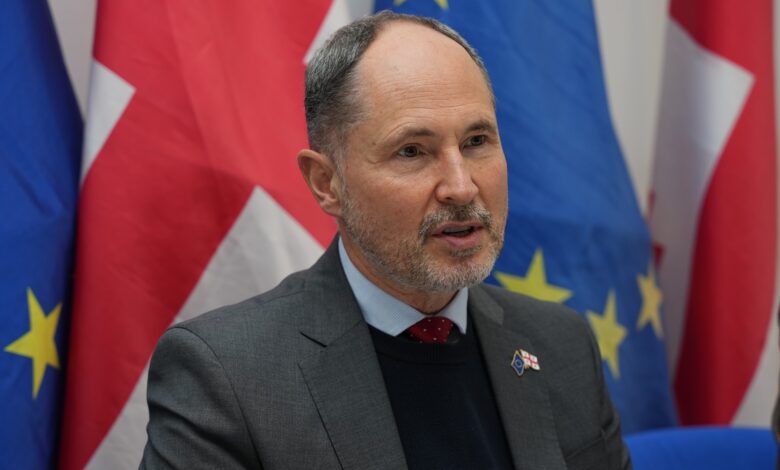
EU Ambassador Comments on Sanctions, GD’s Planned Opposition Ban
European Union Ambassador to Georgia Paweł Herczyński today, May 14, sharply criticized the ruling Georgian Dream party for backsliding on democratic principles while commenting on EU member states’ sanctions, GD’s planned ban on opposition parties and the EU’s possible future actions towards Georgia, questioning the current government’s commitment to European values and willingness to join the 27-member bloc.
Herczyński made his remarks to journalists at an event organized by the Polish Embassy titled “Russian Threat and its Perceptions: Polish, Ukrainian and Georgian Lessons.”
The ambassador said that by applying for EU membership, Georgia committed itself to upholding key principles such as democracy, the rule of law, and human rights, but added that since being granted candidate status in 2023, the ruling party has taken steps that contradict these commitments.
“Even worse, what we have seen in Georgia over several months is intimidation, violence, brutality, and complete impunity of those who have beaten people on the streets,” he said, noting that calls from the EU to the Georgian authorities to change course have been “completely ignored.”
“This is why, as the European Union, we are trying to introduce sanctions against those responsible for violence,” Herczyński added. He noted that while a lack of unanimity among member states has so far prevented EU-wide sanctions, several countries have introduced individual sanctions on their own. “At the same time, at the EU level, we are still trying to introduce sanctions, and hopefully, we will reach a moment in which there will be unanimity among the 27 member states,” he said.
Ambassador Herczyński also addressed the ruling party’s push to ban opposition parties, saying the EU is closely monitoring the situation. “Banning political opposition is not the European way,” he said sharply, calling for dialogue instead.
Responding to criticism that the EU’s decision-making process is often seen as slow and ineffective, the ambassador acknowledged that the EU may move “slowly” but insisted it moves “decisively.” “All those negative developments that have been ongoing in Georgia for the last year are having consequences and will have consequences,” he assured.
Commenting on the EU’s possible suspension of visa-free travel with Georgia, Herczyński stressed that the country has been benefiting from a “privileged relationship” with the EU, built on the Association Agreement, visa-free travel, the free trade agreement, and candidate status. He said these benefits are based on the understanding that Georgia is a democratic country seeking EU membership.
“What we have seen over the last year poses serious questions about whether Georgia is still a democratic country and, secondly, whether Georgia really wants to join the European Union,” he said. “So we need to rethink if all this privileged relationship is still merited. And this reflection is ongoing in Brussels.”
Also Read:
- 29/04/2025 – EU Weighs Suspending Georgia’s Visa-Free Travel, Reviewing DCFTA and Candidate Status
- 23/04/2025 – Zurabishvili Accuses GD of Manipulating Issue of Visa-Free Travel with EU
- 17/04/2025 – Poland Sanctions Georgian Officials Responsible for Violence Against Protesters
- 15/04/2025 – Estonia, Latvia, Lithuania Expand Sanctions on Georgian Officials
- 09/12/2024 – EU Ambassador Condemns Violence Against Demonstrators, Journalists
This post is also available in: ქართული Русский